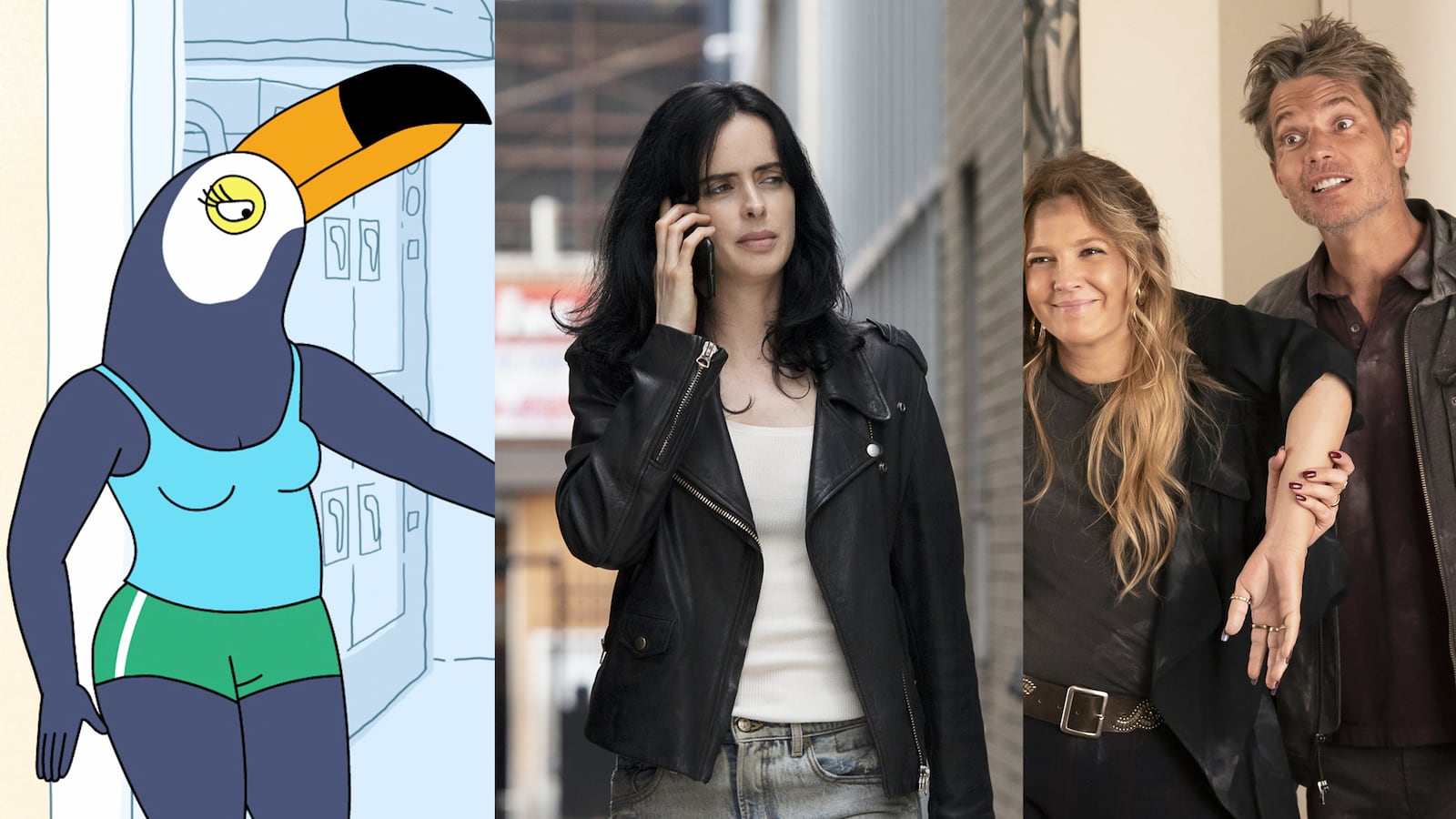On episode two of Lisa Hanawalt’s animated show Tuca and Bertie, Dirk the Rooster, played by an unimpeachable John Early, sexually harasses Bertie (Ali Wong) at work. In response, Bertie’s left breast pops out of her chest, puts on a little hat and storms off, leaving Bertie to walk around work with a gaping hole in her chest. “I am done with today, I need a drink,” the breast, played by Awkwafina, announces. One viewing of this scene is enough to prove that Tuca and Bertie was a show doing unprecedented things, making perfect use of its animated medium to do things live-action shows couldn’t, and it was easy to understand why a very vocal subset of Twitter has gone into public mourning over its cancellation.
The promise of the streaming era was that the alternate pathways to success it offered would create room for the weird, wonderful shows that traditional television didn’t allow. And while that often came true, as with shows like Black Mirror and The End of the F***ing World, it seemed a lot harder for women to get their niche shows renewed. Even as Hanawalt mourned the loss of her show on Twitter, fellow animated show creator Nick Kroll was on Instagram celebrating the season three renewal of Big Mouth. Netflix blames its cancellations on its algorithm, which has been accused of targeting ads based on race, possessing the unconscious bias most AIs have and failing to recommend its new shows to people, including by Hanawalt, who tweeted that her own show wasn’t recommended to her on Netflix.
“Netflix has been pretty ruthless with fan favorites lately,” says Notre Dame American Studies professor Jason Ruiz. “Several of those have been woman-run.” The road to Netflix’s media monopoly is paved with one-season wonders created by women, from Chambers, the first show led by a Native American woman, to The Break with Michelle Wolf, and of the 13 shows Netflix cancelled this year, nearly half were about women or created by them.
With our current glut of entertainment options, from streaming to cable to broadcast television, there is enormous pressure on shows to find their audiences immediately or risk getting lost in the shuffle. But some shows are given more opportunities to find their audiences than others. When you compare a show like Tuca and Bertie to its predecessor, BoJack Horseman, which got mixed reviews on its debut (Rotten Tomatoes’ critics consensus was that it was only “intermittently funny”), it is clear BoJack, an inherently male show about one washed-up horse’s emotional dithering, was given chances Tuca and Bertie, with a critically acclaimed first season, wasn’t. BoJack is on its fifth season and counting. Tuca and Bertie, which is run by BoJack alum Lisa Hanawalt, had one and is done.
“Netflix practically has a monopoly on streaming,” says Ruiz, who is currently living in Colombia, where he says there is the same watercooler talk about Netflix shows that there is in the States. “They’ve got such a glocal reach and it is dispiriting to think that shows like Tuca and Bertie may be imperiled.” Due to Netflix’s lack of transparency, it’s impossible to guess at viewing numbers. The few times Netflix has been explicit about its audience numbers included bragging about the 23 million who tuned into Ava Duvernay’s When They See Us and informing the public that 105 million subscribers had watched at least one episode of Orange Is the New Black. But both of those shows are hour-long prestige dramas. There might be a different set of expectations for half-hour shows with a more humorous bent on womanhood, says Ruiz. Perhaps the almighty algorithm hasn’t found a place for them yet.
“People didn’t know about it,” said sociologist and pop culture expert Nancy Yuen. “It’s very hard to build a fanbase in the first season when no one knows about the show.” Complaints have been thrown around on Twitter about Netflix saving the lion’s share of its promotional budget for shows that are already smash successes, like Stranger Things and Orange Is The New Black. Netflix’s official Twitter account, which has a reach of 6.4 million followers, tweeted about Tuca and Bertie a grand total of three times since it came out, compared to the 13 times it tweeted about BoJack Horseman just in 2014, after its first season came out. This leaves the burden of publicity on the show’s creators, like Hanawalt, who tweeted about her show 24 times prior to its cancellation.
Yuen often thinks of Seinfeld, which began as a flop clinging to its televised status by the skin of its teeth. People weren’t used to shows where not much happened beyond smart people meeting up to trade snappy one-liners about their days. Previous to Seinfeld, Alf, a show about a goofy, smart-mouthed creature with plenty of pratfalls, served as the height of comedy. But Jerry Seinfeld was allowed to experiment. The network gave Seinfeld room to grow into the network tentpole it became. Yet shows run by women, especially women of color, aren’t given those first few seasons to find their audience and experiment. They are held to a standard of excellence right out of the gate and if they don’t immediately achieve it, along with an oversized audience and a critical reception, they are axed.
Netflix, which declined to offer a comment for this story, doesn’t test whether shows will work with pilot episodes the way traditional networks do. The streaming monolith says it has an 80 percent renewal rate from season one to season two of its shows, although it was recently revealed that Netflix often cancels its shows after season three. When it comes to renewals, Netflix says it tends to look at viewing versus cost. If a show is cheap enough, they’ll keep it even if the audience numbers are low, although Netflix has not clarified how cheap a show would need to be to be kept.
“You know if men made this it would be getting renewed,” a commenter wrote on a Change.org petition over 16,000 people signed to save Tuca and Bertie. “If Netflix can renew Big Mouth for three more seasons and also start their own in-house animation studio, they can afford at least one more season of this fantastic show,” wrote another fan. The hashtag #SaveTucaAndBertie trended on Twitter and, amidst the media furor, Hanawalt tweeted that what matters to her is that she still gets daily messages from viewers who connect to the characters and that new people hear about the show every day. “None of this makes a difference to an algorithm,” she wrote, “but it’s important to me and the way I want to continue making art in this world.”






